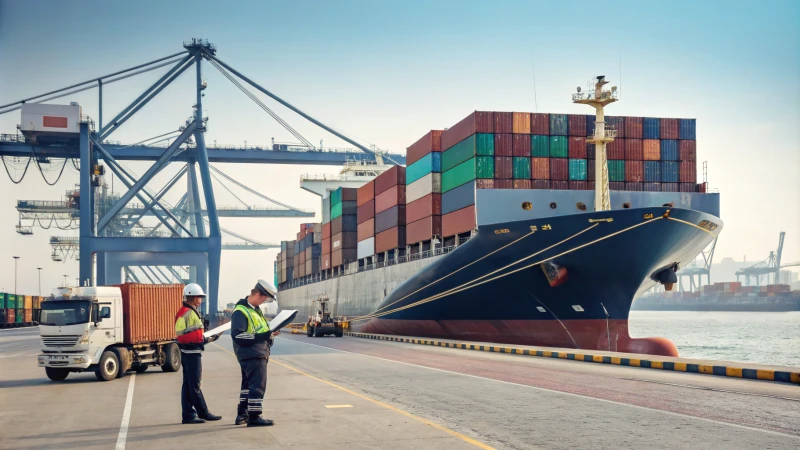Navigating the world of international trade can be as complex as piecing together a jigsaw puzzle without all the pieces.
Delivered Duty Paid (DDP) means the seller handles all responsibilities and costs for getting goods to the buyer's doorstep, including shipping and customs duties. This setup simplifies life for buyers but often results in higher costs as these expenses are included in the price.
I've learned that while DDP seems like a breeze for buyers, it can be a bit of a double-edged sword. Sure, it's convenient because everything's taken care of by the seller—no sweating over customs or hidden fees. But, from my experience, you end up paying more for that peace of mind since those costs are baked into the final price. It's like ordering takeout: you pay extra for not having to cook, but oh, the joy of someone else doing the work! So, before opting for DDP, I weigh it against other Incoterms to see what's truly best for my business needs.
DDP shifts all delivery risks to the seller.True
Under DDP, the seller handles all delivery risks and costs.
DDP is the cheapest Incoterm for buyers.False
DDP simplifies logistics but often increases costs for buyers.
How Does DDP Compare to Other Incoterms?
Unpacking Incoterms is like a passport to international trade adventures. Among them, DDP (Delivered Duty Paid) takes the spotlight for its all-inclusive nature. But how does it really compare to others like DAP, EXW, and CIF?
DDP stands out among Incoterms by placing the most responsibility on the seller. Unlike DAP or EXW, DDP includes all costs until delivery, covering duties and taxes, which streamlines imports for buyers.
What Makes DDP Unique?
When it comes to shipping goods internationally, DDP (Delivered Duty Paid) is like having a friend who handles everything for you—from the shipping and insurance to navigating the tangled web of customs duties and taxes. I remember a time when I was knee-deep in paperwork, trying to make sense of customs forms. If only I had opted for DDP back then! The seller takes care of every detail until the goods are safely in your hands.
| Incoterm | Seller's Responsibility | Buyer's Responsibility |
|---|---|---|
| DDP | All costs and risks | None |
| DAP | Costs except duties | Duties and taxes |
| EXW | Minimal responsibility | All costs post-pickup |
| CIF | Cost, Insurance, Freight | Duties and taxes |
Comparing DDP with DAP
Under DAP1, the seller will deliver your goods to a named location but stops short of covering import duties or taxes. It's like they give you a ride to the airport but expect you to handle your own luggage fees. In contrast, DDP is your all-inclusive ticket—no hidden costs at customs.
Evaluating DDP Against EXW
With EXW (Ex Works), it's as if you're given the keys to the car and expected to drive yourself from the seller's garage. You take on everything from that point onward, including logistics and customs. For those who love being in control, EXW2 might be appealing, but it can be a daunting task for others.
How Does DDP Compare to CIF?
Choosing CIF (Cost, Insurance, and Freight) means the seller pays for getting your goods to the destination port, including insurance. But when it comes to customs duties? That's on you. This differs from DDP3, where you can sit back while the seller takes care of everything right up to your door.
Pros and Cons of Using DDP
Pros:
- Simplifies import process for buyers
- Reduces unforeseen costs during shipping
Cons:
- Higher initial cost as sellers factor in all expenses
- Limited flexibility for buyers who want control over logistics
Choosing the right Incoterm is a strategic decision that reflects your business needs. If you’re like me, and sometimes wish for simplicity, DDP might be your go-to choice. However, if you prefer a hands-on approach with more control, EXW or CIF could be better suited. It's all about finding what aligns with your operational preferences and risk tolerance.
DDP covers all costs including duties and taxes.True
DDP requires the seller to pay for shipping, insurance, customs duties, and taxes.
EXW places all shipping responsibilities on the seller.False
EXW requires the buyer to handle all costs and logistics post-pickup.
What Are the Benefits and Drawbacks of Using DDP?
Ever felt like shipping terms are a foreign language? Enter Delivered Duty Paid (DDP), where the seller shoulders all the stress, including import duties. Sounds ideal, but is it truly the best deal for us?
DDP offers buyers simplicity by having sellers manage all logistics, but it can lead to higher costs due to included duties. It's ideal for businesses seeking convenience, though not always cost-effective.
Simplified Logistics for Buyers
When I first started in the import-export world, I often felt overwhelmed by the maze of logistics and customs procedures. That's why I initially found DDP so appealing. Imagine this: you're a small business in Japan, eager to import the latest tech from China, but the thought of dealing with customs gives you a headache. With DDP, the seller assumes all4 responsibilities—shipping, customs clearance, and duties—so you can breathe easy and focus on growing your business.
I remember a fellow entrepreneur who swore by DDP for his startup. He told me how it allowed him to allocate more resources towards marketing rather than getting bogged down in logistics he barely understood. It was a real game-changer for him.
Complete Seller Responsibility
With DDP, sellers have their work cut out for them. They cover all expenses until the goods land safely at your doorstep. This means taking on transportation costs, duties, taxes, and any surprise fees that might pop up along the way.
Cost Structure Overview
| Expense Type | Responsibility |
|---|---|
| Shipping Costs | Seller |
| Insurance | Seller |
| Import Duties | Seller |
| Customs Charges | Seller |
While this sounds like an ideal5 scenario for buyers, sellers need to be well-versed in international trade regulations and brace themselves for any unexpected price changes in shipping or duties. I’ve heard tales of sellers getting hit with sudden hikes that eat into their profits, turning what seemed like a sweet deal sour.
Higher Product Costs
The ease of DDP isn't without its costs—literally. The convenience comes at a premium as sellers often incorporate these logistical expenses into the product's price tag. This can lead to sticker shock if you're used to negotiating your own shipping terms like FOB or DAP.
One time, I thought I snagged a great deal on some electronic goods only to realize later that opting for DDP had inflated the cost significantly compared to other options where I could handle logistics myself.
Negotiation Leverage
Choosing DDP also means surrendering some negotiating power. With the seller orchestrating everything, there's less room for buyers to haggle over shipping processes or costs. In contrast, terms like FOB let buyers strike better deals with their preferred carriers.
Conclusion Not Needed Here
By getting to grips with both the benefits and drawbacks of DDP, businesses can decide if it aligns with their objectives. Considerations6 such as company size, shipment volume, and geographical distance are crucial in determining whether DDP is the right fit.
DDP simplifies logistics for buyers.True
DDP involves sellers handling all shipping and customs, easing buyer logistics.
DDP leads to lower product costs.False
Sellers include logistics costs in prices, making DDP products more expensive.
Is DDP Always the Best Choice for Your Business?
Choosing the right shipping method can make or break your business strategy. Is Delivered Duty Paid (DDP) the hassle-free solution it seems? Let’s uncover the truth together.
DDP is great for businesses that value ease and simplicity in logistics, but it often means higher costs since the seller takes on all shipping responsibilities. Weigh your priorities carefully before committing to DDP.

What is Delivered Duty Paid (DDP)?
Remember the last time you were so relieved to get something done without having to lift a finger? That's kind of what Delivered Duty Paid (DDP) feels like for buyers. The seller takes care of every little detail to get your goods to your doorstep, including shipping, insurance, and customs duties. It's a dream come true if logistics isn't your thing, but let's not forget this convenience comes with a price tag.
Advantages of DDP
Let's talk about peace of mind. With DDP, you can sit back while someone else handles all the nitty-gritty details. I remember when I first started my business, the thought of dealing with customs and additional charges kept me awake at night. Opting for DDP means those worries are a thing of the past, boosting customer satisfaction and freeing up time to focus on what really matters—like growing your business. For someone like Joson, running a wholesale electronics business in Japan, this could mean honing in on core operations7 without getting tangled up in logistics.
Example Table: Comparing DDP with Other Incoterms
| Aspect | DDP | FOB (Free on Board) | DAP (Delivered at Place) |
|---|---|---|---|
| Responsibility | Seller covers all costs | Buyer covers shipping | Seller covers up to port |
| Risk | Higher for seller | Shared | Moderate for seller |
| Cost | Higher product price | Lower initial cost | Moderate product price |
Drawbacks of DDP
Convenience is king, but it comes at a cost. Sellers aren't just absorbing those logistics fees out of kindness—they pass them onto you through higher product prices. If you're a business laser-focused on cost efficiency8, you might find this less than ideal.
Evaluating Your Needs
Before jumping into DDP, take a moment to reflect on your logistics strategy and budget constraints. Think about importers who deal with large volumes regularly; they might discover that alternatives like FOB or DAP fit their needs better. When I first started importing larger quantities, I realized that each decision impacted my bottom line more than I imagined.
Whether DDP suits you depends on your business model and operational needs9. Take some time to analyze these factors thoroughly to guide you toward making the best choice.
DDP always results in lower costs for buyers.False
DDP often leads to higher costs as sellers include all fees.
DDP simplifies logistics by handling customs duties.True
The seller manages all logistics, including customs and duties.
Conclusion
Delivered Duty Paid (DDP) simplifies international shipping by making sellers responsible for all costs and risks, but often results in higher prices for buyers seeking convenience.
-
Learn how DAP compares with other Incoterms in terms of responsibilities and costs. ↩
-
Discover why EXW gives buyers control over logistics and associated costs. ↩
-
Understand how DDP offers more convenience compared to CIF. ↩
-
Learn about the full range of responsibilities sellers must undertake when using DDP Incoterms. ↩
-
Find out scenarios where choosing DDP might be most beneficial for your business. ↩
-
Discover key factors that should be considered when selecting Incoterms for international trade. ↩
-
Discover how focusing on core operations can enhance efficiency and profitability in your business. ↩
-
Learn strategies to reduce shipping costs and improve overall business efficiency. ↩
-
Find out how to assess your business needs to choose the best shipping strategy. ↩




